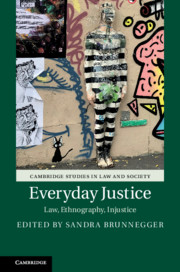Book contents
- Everyday Justice
- Cambridge Studies in Law and Society
- Everyday Justice
- Copyright page
- Contents
- Contributors
- Acknowledgments
- Chapter One Theorizing Everyday Justice
- Part One Im/possibilities of Everyday Justice
- Part Two The Force of Everyday Justice
- Part Three Everyday Justice Unbound
- Chapter Six Troubled Currents and the Contentious Moral Orderings of Drakes Estero
- Chapter Seven Everyday Justice at the Courthouse?
- Chapter Eight Ever in the Making
- Afterword
- Index
- Cambridge Studies in Law and Society
- References
Chapter Six - Troubled Currents and the Contentious Moral Orderings of Drakes Estero
from Part Three - Everyday Justice Unbound
Published online by Cambridge University Press: 28 November 2019
- Everyday Justice
- Cambridge Studies in Law and Society
- Everyday Justice
- Copyright page
- Contents
- Contributors
- Acknowledgments
- Chapter One Theorizing Everyday Justice
- Part One Im/possibilities of Everyday Justice
- Part Two The Force of Everyday Justice
- Part Three Everyday Justice Unbound
- Chapter Six Troubled Currents and the Contentious Moral Orderings of Drakes Estero
- Chapter Seven Everyday Justice at the Courthouse?
- Chapter Eight Ever in the Making
- Afterword
- Index
- Cambridge Studies in Law and Society
- References
Summary
Whose everyday? Whose place? This chapter examines the moral assumptions that anchor the different senses of justice concerning Drakes Estero, located in largely rural and agricultural Marin County, California, Point Reyes National Seashore. Vociferous opposition riddled local communities and spread throughout the region over whether a locally popular, family owner–operated oyster company should be allowed to stay once its federal permits for its terrestrial operations expired, and over whether Drakes Estero, legally designated as potential wilderness, should be allowed to become actual wilderness. This chapter investigates the wide array of notions about just and unjust uses of Drakes Estero manifested in the public sphere and the courtrooms, paying particular attention to the moralities that shaped the conflicts over jobs, ways of life, wilderness, environment, and justice. This conflict illuminates the ways in which contentious notions about uses of US public lands are, for all of their differences, premised on a shared perpetuating of the foundational social relations of what Durkheim calls non-integrative social solidarity. Taken in the larger context of contemporary conflicts over US public lands, this particular conflict leads us to query the forms of civics that arise from the social and legal processes of justice already in place.
- Type
- Chapter
- Information
- Everyday JusticeLaw, Ethnography, Injustice, pp. 135 - 160Publisher: Cambridge University PressPrint publication year: 2019

